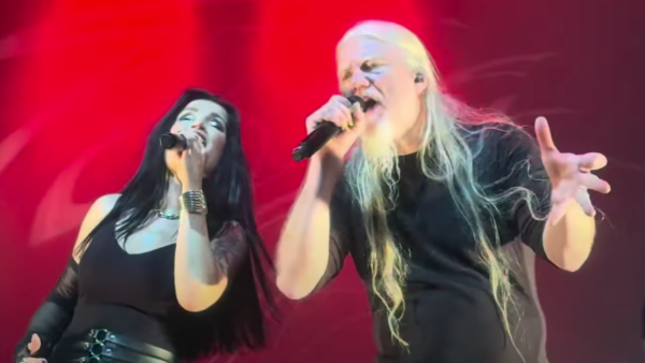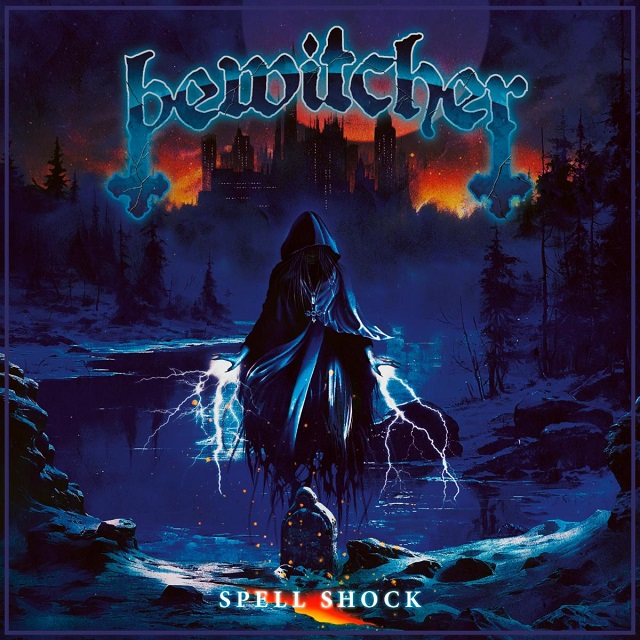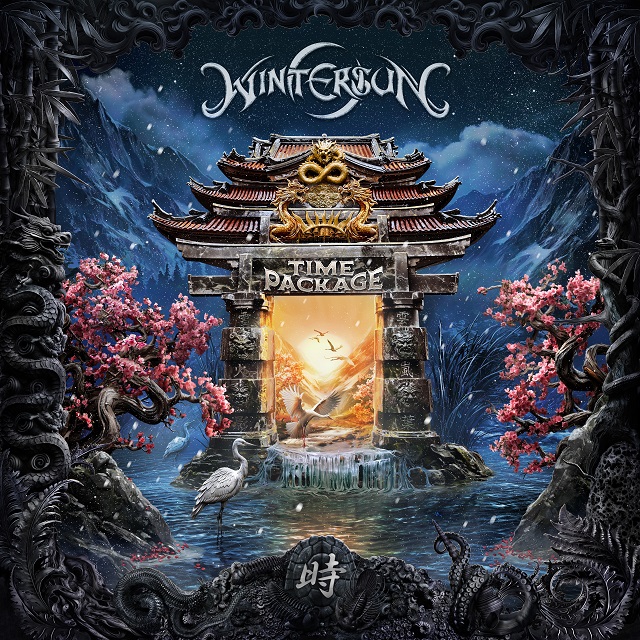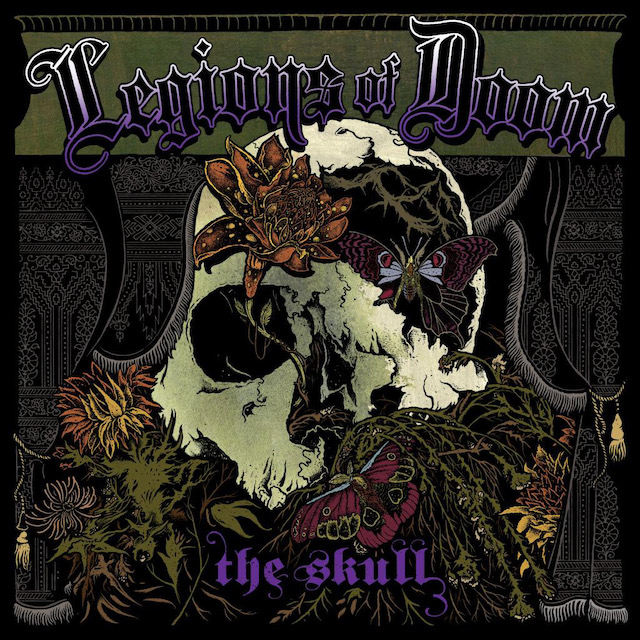Tomas Skogsberg: Modern Metal
Creating The Sunlight Sound
Mixing / ProductionRecordingBy
Joe Matera
The author (left) and Tomas Skogsberg in the control room at Sunlight Studios, Sweden.
Deep in the Swedish forest, we track down a producer whose work has defined the sound of modern metal.
Located about an hour's drive north-east of Stockholm, and a few minutes out of the nearest town Gräddö, the birthplace of Swedish death metal sits quietly in the woods. For the past three decades, this converted barn-cum-studio has been churning out its signature 'Sunlight Studio Sound', and the man responsible is producer, engineer and studio owner Tomas Skogsberg.
Skogsberg learned his trade working at conventional studios in Stockholm, but found the environment restrictive, and wanted to pursue a more original approach to capturing sounds. "I was working in some studios with people who were like thinking in a box," he recalls of his early years. "I would just tell them to not look at the VU meters, but instead listen to the speakers, but it was hard to get them to do this. So I decided I had to start my own studio — but it was a long way to get there."
Eventually, he made the decision to go it alone, and in 1982, he set up the first Sunlight Studios in Stockholm. "I started first with a two-track tape recorder," he says. "Then I moved onto eight tracks, and then moved onto 16 tracks. And it took a couple of years before I began to do some commercial stuff so I could earn enough money for me to be able to do that."
Country Retreat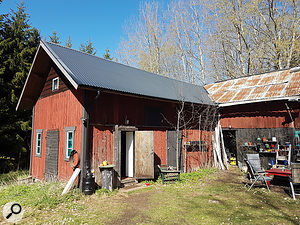
After many years working in Stockholm, Skogsberg relocated Sunlight Studios to the countryside in 2002.In 2002, Skogsberg relocated the studio to its current country location. "I worked in Stockholm for about 15 years and it was a little bit more stressful because of the big city and everything else that came with it. I prefer to do it in a much softer and more relaxed place. Maybe it does not influence the sound directly, but definitely the recording approach and softness to the work, since you are in a country place where it is more of a relaxed atmosphere."
Moving to the country also allows artists to stay in the small cottage next door. With most modern luxuries forgone, it provides the perfect atmosphere for creating and focusing on nothing but music.
As far as the studio itself goes, though, Skogsberg's principles are unchanged. "In the beginning and even now, I had cheap equipment; and even before that, I had very cheap microphones and stuff like that. I really like the sound in the cheap gear rather than the expensive stuff, because you get the sound for free and it's totally unique."
When Death Comes To CallSkogsberg's quest to capture original sounds paid off when in December 1989 a group of teenagers from Stockholm entered Sunlight Studios. Two of the group's members, drummer Nicke Andersson and guitarist Alex Hellid, had previously played together under the moniker of Nihilist. Adding guitarist Uffe Cederlund and vocalist Lars-Göran Petrov to their ranks, they renamed themselves Entombed and set to work recording their debut album, with Skogsberg engineering and producing.
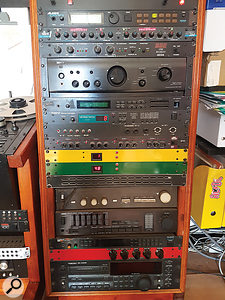
Tomas Skogsberg favours cheap equipment, saying that it often has a unique sound that works to his advantage.When the album Left Hand Path was released the following year, it quickly came to define the genre known as Swedish death metal. "I had worked with some bands prior to Entombed who had the same kind of music," says Skogsberg, "but I didn't find that real sound until I worked with Entombed. We were like a team. Uffe Cederlund, the guitarist in Entombed, was a very good guitarist so it was very easy to work with him. We could try different things together, we would try this and we would try that. And in a couple of hours, we had stumbled upon the sound. But it was not like, 'Oh wow, what have we created here?' It was more like, 'This is the sound!"
As word spread, other bands came knocking at Sunlight's door in the expectation that Skogsberg could do the same for them. "Some of the bands said to me that, though they wanted a similar sound, they didn't want to sound like Entombed," he recalls." I told them that it was not an Entombed sound. It's a sound that came from here [Sunlight Studios] and that's the sound I liked. And sometimes they would say, we want this sound but not Entombed's sound. Yet it was the same sound, they just didn't want to call it the Entombed sound because they didn't want to copy another band. But it was OK to just do the sound, as it was a very similar sound all of the time.
"The important thing though is you have to play in the right mood to get the sound. Some of the guys couldn't handle the sound exactly as Uffe and many of the other guitarists did. I remember many of my engineer friends were all like, 'This is very much like American death metal-sounding.' I disagreed, as that American sound was more like 'in a can' with a strong emphasis on the bass sound. I didn't like it. I wanted more of a mid-range sound."
Tomas Skogsberg: "Because I work with death metal and a whole lot of similar-sounding stuff, 90 percent of the time, that Boss HM‑2 pedal is the sound I work with primarily.
Doctoring The Mid-rangeThat mid-range emphasis is one of the key elements that differentiates Skogsberg's productions from others, so much so that it's given him his nickname. "I like mid-range, so they call me Doctor Mid-range!" he affirms.

Key to the Sunlight Studios guitar sound is the Boss HM‑2 pedal — with all the knobs cranked to the maximum.It's a sound that comes mainly from the Boss HM‑2 pedal — the H and M stand for Heavy Metal — with the knobs turned all the way to maximum. Together with guitars tuned down to C# or even C, the resulting saturation produces the trademark 'buzzsaw' guitar tone. "For extreme metal guitar sounds, I prefer the Boss HM‑2 pedal with much of the mid-range in place. I also like the Marshall amp sound too; with another type of rock & roll, like punk rock, I have to think in a different way, so the Marshall sound is something I will consider. But because I work with death metal and a whole lot of similar-sounding stuff, 90 percent of the time, that Boss HM‑2 pedal is the sound I work with primarily."
To capture the buzzsaw tone, Skogsberg relies mainly on cheap dynamic mics. "I have an AKG SolidTube, but I only use it for acoustic guitars and vocals," he explains. "I don't use that mic for recording electric guitars. For electric guitars I use an Audio-Technica AT41 and sometimes a Shure SM57. I will only use one microphone, and I will always be close-miking the speaker. The AKG I also will use for example on a bluesy-sounding guitar part where you want to keep some reverb or something happening. That is a very good mic to use, but not for heavy metal. I will use a different mic for that, but mainly my go-to mic is the Audio-Technica."
While distorted guitar is Sunlight Studios' bread and butter, Skogsberg also has an ear for good acoustic guitar tones. It is something he first encountered as a teenager listening to David Bowie's 1971 Hunky Dory album, and he singles out the track 'Queen Bitch' as his Holy Grail acoustic guitar sound. "It is a guitar sound with a lot more brilliance and an EQ that features much more of the bass frequencies," he affirms. "It sounds like, 'zing zing'. I personally think the English way of recording acoustic guitar sounds is the greatest."
Old School
Although Tomas Skogsberg usually records to Logic, he remains an old-school producer/engineer who favours analogue equipment.While most studios today are largely digital, using modern DAWs and plug-ins, Sunlight remains primarily an analogue affair." I still have and use one of the first Logic software programs that came out in 1995," says Tomas Skogsberg. "I come from the analogue world, so I try to make the computer sound like analogue. And sometimes I have to use pedals and things going into the computer because I don't like the digital sound at all. But these days you have to work within the digital world, as there are no engineers who can fix the tape recorders. I have a very simple setup in order to decide on the sound for a recording.
"I once worked with a band around the time of getting the Logic program, and they had recorded the vocals in another place. So the band came in with a computer and asked if I could fix the vocals that were recorded on the computer. I spent a week working on it and though I eventually understood how it worked, I was angry by the end of it. Yet people kept saying, 'You should try Pro Tools!' but I would answer, 'No, this is the thing [Logic] I am going to use now.' So I learned it and that is it. I have used it ever since."
Skogsberg has no intention of updating his studio any time soon too, or bringing in new gear. "Sometimes, I will see some new stuff advertised in a magazine that will make me interested in trying it out," he says. "But in the end, I can see and hear that it is not the big thing it says it is in the magazine, where it says 'This is the new thing.' Many years ago I read an article about some new piece of gear which said that the piece of equipment would change your life forever. Not so. Sometimes I will have a bass guitarist or guitarist say to me, 'If you get this piece of equipment it will make your sound.' But it is never like that. I am too old to think in that way now."
Seeing Both SidesWhen it comes to production, Tomas Skogsberg believes that it's important to have an open mind. "It is a very important thing for me to listen to different kinds of music and try to not have a closed mind to anything else. I want to listen with my ears, and feel good when I listen to the music. One of my favourite producers is Rick Rubin. He worked with different kinds of music and musicians and he did it very well. His approach, like with Johnny Cash's albums, is very analogue and very acoustic in the sound. I think that is the point with music: to keep that dirtiness inside the frame and not to clean up too much, so you can feel the room. Sometimes if the guitar is a little bit shouting, like feeding back, save it for the moment. Don't clean it up."
Thus, although death metal is Skogsberg's stock in trade, he is open to working with other bands, especially those that are more punk and rock-oriented. His work with Backyard Babies on their albums Total 13 (1998) and Making Enemies Is Good (2001) even earned him a couple of gold records. Though his approach to recording non-metal acts differs, his mindset remains the same. "It's not the same approach, yet it is the same thinking, because for me, I don't like the mainstream music which is all down the middle," he says. "I like it on the left side and right side but nothing in the middle. So I try to do some things in the sound to make it different. For example, with the Backyard Babies we did the album Total 13 originally with much more of a punky sound, but the record company didn't like it. So we had to redo the album a lot more softer. I remember skipping over some songs and they [the record label] called me really angrily and said, 'How could you skip that song?' I knew we had to make 'hit songs' but I wasn't thinking that way. I was thinking more in a punk way. Those original tracks later appeared on a Backyard Babies EP, Knockouts, where you can hear the difference between the original punkier version compared to the more polished version."
Asked which of his productions he's most proud of, though, and he returns to the metal band with which he'll always be associated. "There are many," he says, "but I have to say Wolverine Blues [1993] by Entombed, because that is very close to my favourite kind of music. It is death & roll: a mix of death metal and rock & roll. It is like the Motorhead stuff. That is a record I am very happy with."
Custom Console
At the centre of Sunlight Studios sits Tomas Skogsberg's pride and joy: a custom mixer. "It's an old '80s desk, and the EQ buttons on there help me very much. And because of this, I don't want to change equipment.
"In the beginning, I had an 18:8:2 combination and now it is a 36:16:2. I have a friend who helps me with some of the electronic things, and there was this one time where he helped me run a little bit more electricity into the desk. I told him, 'It will sound like how I want it to sound.' But he checked it and said, 'Oh no, there's too much electricity going into the desk now, so I have to change it.' And he did. But I thought, 'No, it's not the same desk any more,' so I made him change it back. He told me that because there was too much electricity going into it, he could not promise that one day it would not explode! So I treat it like an old car, I just don't touch it. Maybe it's magic or hocus pocus, but I do feel it is something that is good for sound.
"I am not a sound engineer, I am a producer, but this is my tool. I don't know much about the exact frequency or the number of it. I'm not much into the technical terms or approaches. I am more about tweaking the knobs and listening to the sound. I don't care about whether it's like this or like that. For me the important thing is that it sounds good. Many times when I work with engineers it is very cool for me because I can then only think about the sound and what's happening with the musicians and things like that. And I will let the engineer handle all that tech stuff."
